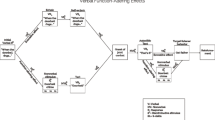Abstract
In Verbal Behavior Skinner identifies a small number of elementary verbal relations, one of which is the mand. Because its introduction is at first in terms of unlearned motivative variables, and because the mand’s relation to prior controlling events is quite complex, its general significance has probably been underestimated. An extensive treatment of establishing operations, including the warning and the blocked-response conditioned establishing operations is provided, followed by a description of the mand in terms of such operations. The importance of the mand for language training programs is suggested, as well as the reasons why it is typically neglected in such programs.
Similar content being viewed by others
References
Carroll R. J., & Hesse, B. E. (1987). The effects of alternating mand and tact training on the acquisition of tacts. The Analysis of Verbal Behavior, 5, 55–65.
Hall, G., & Sundberg, M. L. (1987). Teaching mands by manipulating conditioned establishing operations. The Analysis of Verbal Behavior, 5, 41–53.
Hart, B. M., & Risley, T. R. (1975). Incidental teaching of language in the preschool. Journal of Applied Behavior Analysis, 8, 411–420.
Keller, F. S., & Schoenfeld, W. N. (1950). Principles of psychology. New York: Appleton-Century-Crofts.
Michael, J. (1982). Distinguishing between discriminative and motivational functions of stimuli. Journal of the Experimental Analysis of Behavior, 37, 149–155.
Michael, J. (1983). Evocative and repertoire altering effects of an environmental event. The Analysis of Verbal Behavior, 2, 21–23.
Peterson, N. (1978). An introduction to verbal behavior. Grand Rapids: Behavior Associates.
Skinner, B. F. (1953). Science and human behavior. New York: Macmillan.
Skinner, B. F. (1957). Verbal behavior. New York: Appleton-Century-Crofts.
Stafford, M. W., Sundberg, M. L., & Braam, S. J. (1988). A preliminary investigation of the consequences that define the mand and the tact. The Analysis of Verbal Behavior, 6, 61–71.
Sundberg, M. L. (1983). Language. In J. L. Matson & S. E. Breuning (Eds.) Assessing the mentally retarded (pp. 285–310). New York: Grune & Stratton.
Sundberg, M. L. (1987). Teaching language to the developmentally disabled: A course manual. Prince George, B.C.: College of New Caledonia Press.
Author information
Authors and Affiliations
Rights and permissions
About this article
Cite this article
Michael, J. Establishing operations and the mand. Analysis Verbal Behav 6, 3–9 (1988). https://doi.org/10.1007/BF03392824
Published:
Issue Date:
DOI: https://doi.org/10.1007/BF03392824



